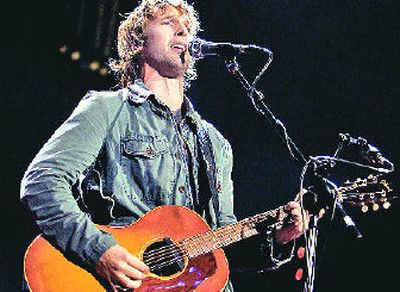New British invasion

The debut CD of British singer Amy Winehouse recently hit No. 1 in her native U.K. and bagged her a Brit Award for Best Female Solo Artist.
For decades that would have meant zilch in the States. But Winehouse is getting a very different reaction here now.
Her kickoff song, “You Know I’m No Good,” was iTunes’ “Single of the Week” as well as the “most added song” on American Rhythmic radio formats, while gaining “Big 10” rotation on MTV.
Luckily for Winehouse (whose full CD arrived Tuesday), she’s coming over amid a British invasion the likes of which America hasn’t experienced since the heyday of acts like Culture Club, Eurythmics and Depeche Mode in the 1980s.
Paving the way for stars like Winehouse were such Brits as James Blunt, Corinne Bailey Rae, KT Tunstall, Celtic Woman and Snow Patrol, each of whom has sold at least 1 million records in the States in the last year.
Natasha Bedingfield moved nearly 800,000 copies of her most recent CD, and promising sales figures continue to mount for up-and-comers Lily Allen, Imogen Heap and Paolo Nutini.
At this year’s Grammys, three out of five candidates for Best New Artist were British (Blunt, Rae and Heap). While they all wound up losing – to an “American Idol,” no less (Carrie Underwood) – their sales shot up significantly in the week after the show.
Compare those triumphs to the low point for British pop: the benighted 2001-02 season. Back then, for the first time since the Beatles led the first British invasion in 1964, not a single U.K. act appeared anywhere on Billboard’s Top 200 Album list.
It was the last straw for the British, who’d already endured years in which their biggest acts – from Oasis to Blur to the Verve – enjoyed fleeting, often second-tier U.S. hits, only to bomb quickly afterward.
The Spice Girls had a bigger impact (though briefly) and things began to turn around, by inches, when Coldplay’s star started ascending in 2002. But it took another few years for this full wave to swell.
So what changed?
For one thing, there’s been a dip in pop radio’s interest in hip-hop. Rap sales were down 21 percent last year, opening up room for something else.
“Radio has become more pop-friendly, post-‘American Idol,’ ” says radio analyst Sean Ross – which favors the melody-mad Brits.
For all the changes on radio, however, TV has actually provided a bigger boost to many new U.K. artists.
Corinne Bailey Rae only broke through after an appearance on “Oprah.” Likewise, Snow Patrol cracked the U.S. market by getting their song “Chasing Cars” on “Grey’s Anatomy” before they made headway on radio.
For years, things had spiraled in the opposite direction.
“Because of the climate at radio and the live scene for British bands, American labels weren’t putting money into them for touring,” says Phil Patterson, who heads a group that promotes the export of U.K. acts.
“The bands thought, ‘What’s the point of coming over when you’ll spend hundreds of thousands of dollars and probably lose money hand over fist?’ They were better off staying in Europe or going to Japan or Asia, where they could make money.”
For the most part, it’s a particular kind of U.K. artist that’s been selling over here – and not the cutting-edge stars.
The cool Arctic Monkeys may be No. 1 at home, but they barely sold 300,000 copies of their debut in the U.S. Likewise, big Brit rap stars like Lady Sovereign have been unable to make the transition to these shores.
Instead, mature, adult-oriented acts like Blunt and Rae have shot to platinum status.
Ross says these artists are favored by the tilt at radio and TV toward “quality singer-songwriters” as a corrective to all those years devoted almost entirely to teen-driven hip-hop.